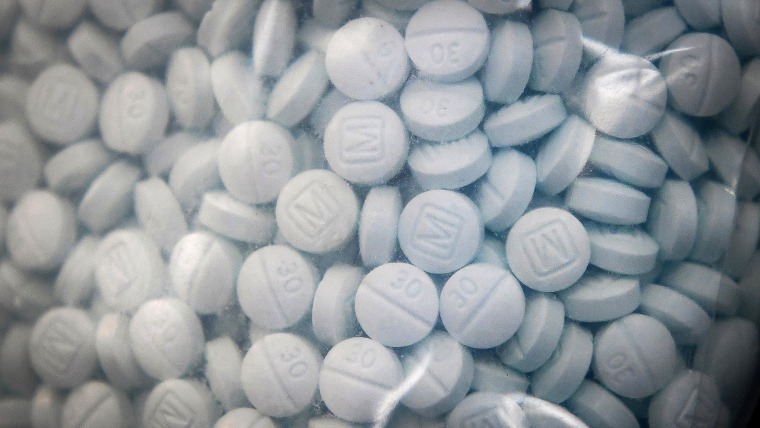WASHINGTON — The White House on Thursday asked Congress for nearly $800 million in additional funding to fight drug addiction and overdoses, which killed more than 100,000 people in the U.S. last year, according to provisional data from the Centers for Disease Control and Prevention.
The request comes during a "critical inflection point," Dr. Rahul Gupta, the director of the White House Office of National Drug Control Policy, said in an interview. He said that after years of increases in overdose deaths, the trend is starting to flatten out.
"Just like a large ship, you have to slow it down, stop and then turn it around," Gupta said. "And that's exactly what we're seeing in real time."
He said someone in the U.S. dies every five minutes from an overdose, "so the urgency could never be more important at this point in time."
The funding request, which was detailed first to NBC News, is part of a larger funding appeal from the director of the Office of Management and Budget, Shalanda Young.
On Thursday, Young sent a letter whose recipients included House Speaker Kevin McCarthy, R-Calif., and the Democratic and Republican leaders of the House and Senate appropriations committees requesting supplemental funding for Ukraine assistance, disaster recovery and border management.
Young said in the letter that the requested resources to manage the Southwest border include efforts to reduce the "influx" of drugs like fentanyl.
"We are operating within a fundamentally broken immigration system — everyone agrees on that point — but only the Congress has the power to update our immigration and asylum laws, and we continue to stand ready to work with Congress on solutions," she said.
Reached for comment, a McCarthy spokesperson said in an email: "A Republican-led House will not rubber-stamp any blank-check funding requests; rather, the Administration’s emergency funding requests must be reviewed and scrutinized on their merits consistent with the practice and principles of our majority."
Leaders of the Senate Appropriations Committee Sens. Patty Murray, D-Wash., and Susan Collins, R-Maine, said in a statement that they "look forward" to reviewing the funding request and called the targeted areas "important priorities."
The letter’s other recipients did not immediately reply to requests for comment.
The new drug prevention-related funding aims to expand access to addiction care and help the departments of Justice, Homeland Security, and Health and Human Services reduce the amount of fentanyl entering the U.S.
Of the approximately $800 million, $350 million would go to HHS for prevention, support and recovery services, $50 million of which would be transferred to the Indian Health Service. DHS would receive $323 million to fund fentanyl detection at ports of entry and counter drug trafficking.
Gupta said he is "absolutely optimistic" that Congress will grant the funding.
"This is a bipartisan issue, and this is exactly why the president has made this one of the four pillars of his unity agenda, because he's aware and he knows that this is an issue that no one individual, agency or state can solve for themselves," he said. "This is going to take an all-hands-on-deck approach."
The number of drug overdose deaths last year reached about 105,000 in the U.S., relatively similar to the previous year, according to provisional data from the CDC. The CDC projected that more than 82,000 of them involved opioid overdoses.
A CDC report last year found that the rate of fatal drug overdoses rose by 30% from 2019 to 2020, with most of the deaths due to fentanyl.
Xylazine, an animal tranquilizer, is on the rise in fentanyl products. The monthly percentage of deaths from illicitly manufactured fentanyl products that included xylazine spiked from 2.9% in January 2019 to 10.9% in June 2022 in 20 states and Washington, D.C., according to a CDC study.
Last month, the White House released a national response plan for handling the drug combination. That followed April's announcement that the director of the White House Office of National Drug Control Policy was designating the drug combination as an emerging threat.
President Joe Biden included addressing drug overdoses as part of what the administration has dubbed his "unity agenda." The agenda outlines four areas for bipartisan cooperation: addressing drug overdoses, prioritizing mental health, fighting cancer and supporting veterans.

